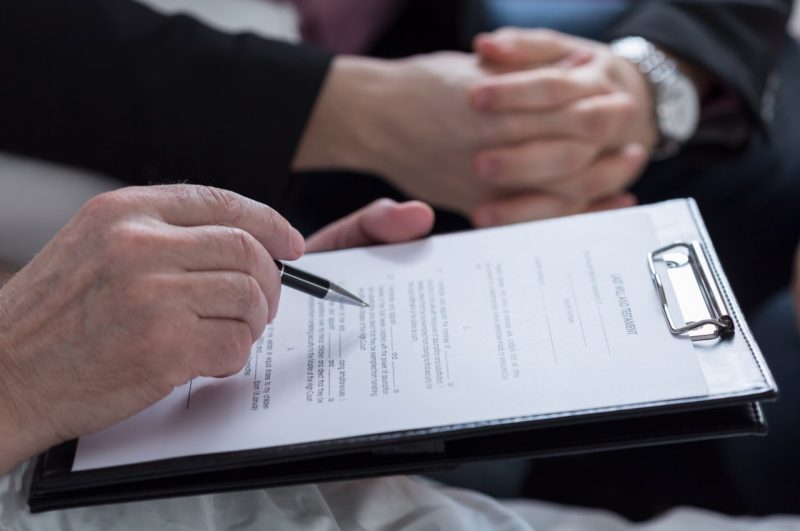Estate Planning: What To Include In A Simple Florida Will
Estate Planning: What To Include In A Simple Florida Will

Starting to plan your estate may be an overwhelming process. Knowing where to start seems to be a common problem to some people. And more importantly, some are still confused about what to include in their will. With the help of this article, you will be equipped with basic knowledge on how to start preparing your will.

How Is A Simple Will Prepared For Estate Planning?
Creating a will can help you in many ways. You can use it to ensure that your assets will be left to their rightful beneficiaries. A will also allows you to appoint a legal guardian for your minor children and pets.
Moreover, you can name a person who will manage your property in probate proceedings. Preparing a simple will in Florida is an easy task to do with the assistance of a skilled estate planning lawyer.
- Decide what property you will include in your will.
- Choose your beneficiaries and what they will inherit from your estate.
- Choose an executor that will manage your properties and attend probate court proceedings.
- Appoint a legal guardian if necessary.
- Write any additional instructions you want to leave such as any plans to donate to charity or other organizations.
- Sign your will with at least two witnesses and store your will in a safe place.
What Should You Include In A Simple Will?
To help you make your will, here are some of the most important inclusions you should remember.
Inventory Of Estate
The gross estate refers to the total value of the property you will leave to your beneficiaries. Make sure to have an inventory of all your assets and properties first before writing your will. This will guide you in deciding the distribution of your assets to your beneficiaries. The will must clearly specify which property shall be distributed to a certain beneficiary to avoid confusion.
Your Beneficiaries
Beneficiaries are the persons, organizations, or charities that will inherit your estate. This can include family members or friends. You can also gift your estate to a charity as a donation.
Your Executor
An executor is someone who will handle your estate and represent you in probate court. The executor must also make sure that every wish in the will is executed. It is important to remember that the executor’s name shall be clearly specified in the will. Make sure to notify the person you assign as an executor, and that they are aware of all their responsibilities.
Your Appointed Legal Guardian For Your Minor Children Or Pets
If you have a minor child, the state allows you to appoint a legal guardian that will take care of them until they reach the age of maturity. You must also communicate to the legal guardian the appointment and all their duties and responsibilities.
Someone Who Will Manage The Property Of Your Minor Child
The state also allows you to appoint someone that will take care of the property your minor child has inherited from your estate until they reach the age of maturity. Again, the said person must be aware of his appointment and responsibilities.
Your & Your Witnesses’ Signatures
A will must be signed by you and your witnesses at the same time. It is important to note that everyone involved must sign the will in everyone’s presence.
What Assets Should Not Be Included In A Simple Will?
After discussing what should be included in your simple will, here are some of the assets that must not be a part of it.:
- Joint tenancy property. This does not have to be a part of your will because there’s already an existing law that governs who shall receive it at the time of your death.
- Life insurance. Upon signing the policy of life insurance, you already have chosen your beneficiaries. Hence, they will automatically receive the proceeds upon your death.
- Joint accounts. The portion of the joint accounts left shall be given to the surviving joint account holder.
- Pension benefits. There’s also an existing policy that the proceeds of your pension benefits will automatically be given to the surviving spouse.
- All properties that you do not have any right to the title of ownership. Hence, this includes any assets you are only renting.
What Happens If You Don’t Make Your Own Will?
If you are not able to make a will before the time of your death, the court will apply the intestacy laws in distributing your properties. In Florida, the intestacy laws provide that your property shall be given to your closest relatives. This will begin with your spouse and children.
If you don’t have a spouse or children, the state will distribute your property to your grandchildren or parents. If still unavailable, the list will go down to your distant relatives, which include any of your siblings, grandparents, aunts or uncles, cousins, or even the relatives of your spouse.
In cases where the state has already exhausted the list and proven that there are no close relatives who can inherit the properties, your estate will go to the state.
What Are Digital Wills & Are They Allowed In Florida?
Digital wills are basically electronic versions of a will. Florida is among the six states in the US that allow the creation of a digital will. People opt to create digital wills if they want to avoid personal meetings and want to create the will at home due to health and safety reasons.
Digital wills can be created through an audio-video online call. Here, the real-time signing, witnessing, and notarizing of the will happens. During the call, the testator will be asked if (1) they are under the influence of any alcohol or drugs, (2) whether they have a disability that causes impairment to their everyday living, and (3) whether they need everyday assistance to take care of themselves.
The call must be recorded. If the testator has answered a “yes” to any of the questions above, they cannot create a digital will. This is because the competence of the testator to create a will would be in doubt before a court. More about our estate planning lawyer services.
Are Emancipated Minors Allowed To Make A Will In Florida?
The state of Florida does not allow residents under 18 years of age to create their own will. However, an exception is made for emancipated minors. Emancipated minors are allowed by the state to make and execute their own will.
Emancipation refers to the legal procedure for minors to be considered adults before they reach the age of maturity. Once a minor is emancipated, their parents will no longer hold custody or control of them.
Can You Make An Heir A Witness Of Your Will?
As a general rule, any competent person is allowed to act as a witness in the execution of a will. However, it is not recommended to choose a possible heir as a witness. Choosing a potential heir can create a future problem with the will execution.
There might be a possibility that the court invalidates your will. The court can conclude that the potential heir has used force on you to include them in your will. So, even if you really wish them to take part in your wealth, the court might not award it to them.
The best way to ensure this is to ask someone neutral to act as a witness and avoid choosing those who are closest to you.
Reminders When Making A Will In Florida
States have different rules and regulations when it comes to making and executing a will. Here are some reminders to guide you in ensuring that your will is valid and legally binding in Florida.
- The will must be in writing.
- Holographic wills are not allowed in Florida. Holographic wills are wills that do not have witnesses. In Florida, the testator must sign the will together with at least two witnesses.
- The will must be written by a competent person. A competent person in Florida is someone of sound mind and someone who is 18 years of age and older. As mentioned, emancipator minors are also allowed to make their own will.
- The will must have the signature of the testator and the witnesses.
- There are no official forms required in executing a will.
- Wills in Florida can be changed, updated, or revoked before the death of the testator.
There is also no need to notarize your will in Florida. However, if you want to make your will self-proving, an affidavit for self-proving must be notarized. Making your will self-proving can speed up the probate proceedings. This is because your executor will no longer need to put on additional work to prove the validity of the will.
What Is The Timeframe For Filing A Will In Florida?
The executor must file the will within 10 days of learning of the testator’s death. This can be done by simply going to the court’s clerk in the county in which the executor resides.
The Estate Plan
Based in Coral Gables FL, The Estate Plan is a law firm that assists clients to ensure that they carefully and effectively plan their estate. One of its primary estate planning services is the creation of a will. The Estate Plan starts with getting to know their clients better. Understanding their situation helps them to provide the best and suitable service for them.
The Estate Plan ensures that they educate their clients with the procedures best for them. The firm will then help you complete all the necessary requirements. The ultimate goal of The Estate Plan firm is to help you accomplish your wishes for your beneficiaries.If you need help with your will and estate planning, contact The Estate Plan in Coral Gables FL now.
&
Have questions about how to get started on your estate plan or estate needs?
Have questions about how to get started
on your estate plan or estate needs?
Contact the experienced estate planning professionals at The Estate Plan
by calling us at (305) 677-8489.
Contact the experienced estate planning professionals at The Estate Plan by calling us at
(305) 677-8489.

